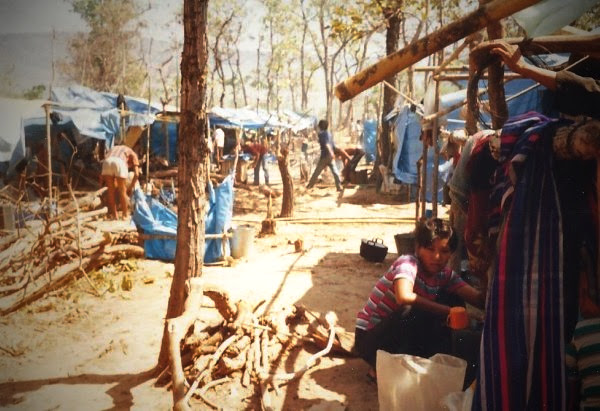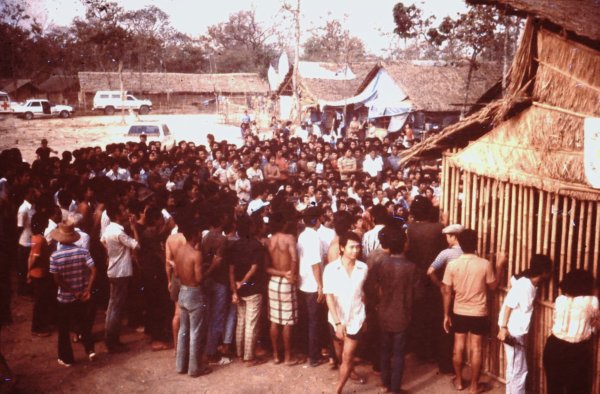Fr. Thomas Dunleavy, M.M.
It had been 30 years since I had seen most of the 400 people gathered for a special reunion in Montreal, Canada, last June. I had served them when they were refugees struggling for survival in camps in Southeast Asia. Now they are living happy, productive lives, many of them business professionals and educators. As I greeted them, I was overcome with joy.
My mind flashed back to 1980 when I landed in Bangkok, ready to meet them. The Vietnam War had ended and the Khmer Rouge had fled Cambodia, but the war and the atrocities of the Khmer Rouge had left thousands of Vietnamese, Cambodians and Laotians homeless and desperate to escape their countries. Many who tried to flee by boat drowned at sea. Countless others, who didn't have the money to buy a seat on a boat, took the treacherous journey on foot, walking through mine fields, across Vietnamese army lines, through Khmer Rouge territory and around Thai security forces. Those who survived became known as the "Vietnamese Land Refugees."
Recognizing their dire needs, Father James Noonan, then Superior General of the Maryknoll Fathers and Brothers, asked me to go and help them.
Initially I worked with Catholic Relief Services in the refugee camps, which were all inside Cambodia except for Khao-l-Dang, which was in Thailand. The camps, housing 50,000 to 60,000 refugees, were under constant threat of being overrun by the Vietnamese army, the black-clad soldiers of the Khmer Rouge or bandits. The Thai military provided some security in a very dangerous situation.
Eventually I became part of a team that included the United Nations High Commissioner for Refugees (UNHCR), the International Red Cross, and an assortment of volunteers and non-governmental organizations (NGOS). Each day we rode to the camps in a convoy of trucks led by the Thai military. Our mission was to bring to the refugees food, water, medical supplies and bamboo for their housing. My official role was to provide pastoral care to the refugees and NGO personnel. Performing baptisms and marriages, hearing confessions and blessing the dead were part of my daily life in the camps. Much of my time was given to bolstering spirits.
Refugees despaired of ever being able to return to a normal life. They thought they would die in the camps. Many of the youth contemplated suicide. I tried to cheer them up
with whatever candy and ice cream I could afford. Listening to their fears and problems, I became part of the fabric of life in the camps. At any given time I could be arrested by the Thai authorities for speaking out on human rights or sneaking mail from home to the refugees. At the reunion I found out how much they feared for my safety when one man told me, "Every time I saw the Thai police approach you, my legs gave out."
Our team helped the refugees fill out their papers when they applied for resettlement in other countries through UNHCR and/or foreign embassies. Most of the older refugees could not read English, which was the language of the camps, the United Nations and embassies.
When a list was posted with the names of families to be resettled, we tried to give comfort and hope to those who remained. Sometimes that meant stretching the truth. I remember telling those not on the list that a new list would be coming soon. In fact, it took up to seven years for some to be resettled.
Each evening when our team members returned from the camps to our headquarters in Aranyaprathet, Thailand, near the Cambodian border, I offered Mass for them. On weekends I offered Mass in at least five camps. I trained the Catholic refugees to put their faith into action by assisting their fellow refugees in filling out resettlement applications, reading notices and helping the elderly get their share of the food. They were to help all, regardless of their faith. Once, after delivering food to a Muslim refugee, the Catholic refugees were upset because the woman had gotten down on her knees to thank Allah. I reminded them we all worship the same God.
Attendance at Mass in the camps ranged from 100 participants to as many as 3,000. Many non-Catholics attended. I felt privileged to proclaim the kingdom of God to refugees as well as Thai authorities, guards and soldiers, even if they listened for different reasons.
Last summer, the Vietnamese Land Refugees celebrated their freedom by holding a reunion in Montreal, where many of them had been resettled. During the banquet following a special Mass, they tearfully gave witness to their experiences in the camps.

They were lavish in their expressions of gratitude to me for anything I had done to help them. The most beautiful and moving testimony for me was when they said they had continued throughout the years to think of me as their parish priest. When they presented me with a plaque in gratitude for my dedication to them, I could feel the love that has for three decades sustained our bond of friendship.
I continue to work with refugees in Thailand. Some are Vietnamese Hill Tribe people; others Tamal people from Sri Lanka as well as Christians from Sri Lanka and Pakistan, Muslims from the Middle East and victims of violence from West Africa.
And the former Vietnamese Land Refugees now help me. They have given me more than $20,000 for my current work and the assurance that they will continue to support my ministry to today's refugees.























 Wednesday, July 20, 2016
Wednesday, July 20, 2016


